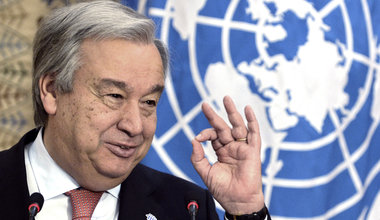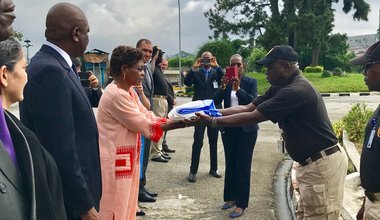INTRODUCTORY REMARKS FOR THE PRESS CONFERENCE
Abidjan, 11 March 2011...
As we enter the fourth month
since the 28 November 2010 presidential election, the post-electoral
crisis in Côte d'Ivoire, unfortunately, shows few signs of abatement. It is
darkest just before the dawn. I have never doubted that the will of the people
would prevail in the end and the end will arrive sooner than expected. However,
for the moment, the suffering of the Ivorian people increases day by day, the
number of casualties continues to rise and a clear vision in terms of the
evolution of the situation is lacking.
Under the circumstances, I
find it necessary to clarify UNOCI's role, which consists of three essential
tasks: protecting civilians, protecting the Golf Hotel and safeguarding the
result of the presidential election.
The protection of civilians
With regard to the protection
of civilians, UNOCI will continue carrying out its patrols, especially in those
areas where civilians are in imminent danger. Since the outgoing President
demanded the departure of UNOCI on 18 December 2010, harassment and hostile acts
against UNOCI's civilian and military personnel have become part of the game.
As such, UNOCI has become one
of those rare, if not the only, peacekeeping mission, that continues operating
despite the request for its departure by the de facto military authority of the
host country. In order to better protect civilians, UNOCI's military capacity
will be reinforced with 2,000 blue helmets and three armed helicopters as
authorized by the United Nations Security Council. At this point, I want to
stress that this force will be used as a force of peace and protection
within the principle of complete neutrality and impartiality.
Let me make one more point on
the protection of civilians. Besides our patrols and direct interventions in
case of imminent danger with regard to the civilian population, UNOCI is
documenting, analyzing, investigating and accumulating evidence of abuses and
human rights violations with a view to making those who are responsible for such
acts, accountable, no matter which camp they belong to. We should not forget
that, as it is clearly laid out in Security Council resolution 1962 (2010), "the
Ivorian leaders bear primary responsibility for ensuring peace and protecting
the civilian population in Côte d'Ivoire."
I would like to highlight the
unforgivable killing of women who were expressing their opinion peacefully last
week in Abobo by the special forces of President Gbagbo's camp; I unequivocally
condemn these killings by machine gun; I assure you that the death of these
seven innocent women will not go unpunished. With regard to the human rights
violations since the post-electoral crisis, let me reiterate UNOCI's warning
against those perpetrators: "do not have any illusion that you can commit human
rights violations with impunity; the days of reckoning are fast approaching;
UNOCI is documenting your violations."
The protection of the Golf
Hotel
With regard to the protection
of the Golf Hotel, UNOCI devotes a significant portion of its Abidjan-based
military capacity for this purpose. Without our presence at the hotel, those who
are under our protection may be forced to move to Bouaké, thus most probably
resulting in the division of the country and an immediate resumption of the
civil war. Such is the importance of our protection of the Golf Hotel. Despite
this significant contribution that UNOCI is making to the Ivorian peace process,
President Gbagbo's camp makes all sorts of allegations of collusion between
UNOCI's protection force and Forces Nouvelles elements present at the Golf
Hotel.
Let me stress once again that
UNOCI's military impartiality applies in this instance as well: it has been
strictly forbidden to UNOCI to transport or arm the Forces Nouvelles elements,
including those at the Golf Hotel. The presence of Forces Nouvelles elements at
the Golf Hotel is consequential to the agreement between the FDS and the FN.
Thus, President Gbagbo's camp should face this issue, which is of its own
making, without involving UNOCI.
UNOCI's impartiality
Since the eruption of the
post-electoral crisis, there has been innumerable stories and propaganda aimed
at questioning UNOCI's impartiality, especially in the military domain. They
include: UNOCI is transporting and arming Forces Nouvelles elements as well as
pro-Ouattara civilians; UNOCI has a secret attack plan which includes the use of
newly-acquired armed helicopters, etc. All these stories are pure invention.
There is not a shred of truth in them.
UNOCI's military impartiality
is one of the cornerstones of its existence in Côte d'Ivoire. UNOCI has been,
is, and will continue to be, a force of peace and protection, and never a force
of aggression and attack. Since they can only return fire only when they are
shot at, UNOCI's peacekeepers are constantly in harm's way. But this shall in no
way discourage us to remain soldiers of peace, and not of aggression. How could
it be otherwise when UNOCI's most current mandate includes "to continue
observing and monitoring the compliance by the parties with the comprehensive
ceasefire agreement of 3 May 2003 in order to prevent the resumption of
hostilities?"
Safeguarding the result of the
presidential election as recognized by ECOWAS and the African Union is a crucial
element of UNOCI's mandate as defined in Security Council resolution 1962. It
goes without saying that safeguarding the result is also part of my
certification mandate of the Ivorian elections. The respect of the will of
people is the most fundamental principle of democracy and any respectable
political game. UNOCI and I, as certifier, shall continue safeguarding the
result of the election as expressed on 28 November 2010.
Here, I want to clarify one
important aspect related to UNOCI's safeguarding of the result of the election,
as confusion and unrealistic expectations exist in this regard. All UNOCI's
actions must be based on our military impartiality. In others words, under the
current mandate, UNOCI's actions in this regard can only be peaceful: no attack
or occupation of any facility or area in Côte d'Ivoire is on the cards.
In this regard, I would like
to underline that one of the crucial elements of UNOCI's mandate as defined in
Security Council resolution 1962 is "to facilitate, as appropriate, political
dialogue between the Ivorian stakeholders in order to ensure peace in Côte
d'Ivoire and respecting the outcome of the Presidential election as recognized
by ECOWAS and African Union." With this in mind, UNOCI is open to and has been
maintaining contacts with all the Ivorian parties, both civilian and military.
Our ONUCI FM radio is open to all the parties. UNOCI's leadership is available
for interviews with the media of all the parties. Such is the extent of UNOCI's
impartiality in the political domain. UNOCI's certification of the result of the
elections, which is telling the truth, is not to be confused with UNOCI's
impartiality in all other domain.
Telling the truth and acting
with impartiality
"Telling the truth and acting
with impartiality" which sums up UNOCI's position, has proved to be a
challenging proposition for the Ivorian protagonists. This is so because each of
the two opposing camps in the Ivorian crisis wants UNOCI to take a different
position: one camp wants UNOCI to "tell the truth and act partially in line with
the truth" whereas the other wants UNOCI to "act impartially and not tell the
truth." Indeed, we, at UNOCI, do not have the luxury of complacency.
Recently, direct and hostile
acts against UNOCI have been on the increase. At times we are witnessing extreme
measures such as peacekeepers being directly shot at, the kidnapping of UNOCI
staff, ransacking of their residences, hijacking their cars, etc. These extreme
measures are based and motivated by a series of propaganda invented by President
Gbagbo's camps' partisans themselves, questioning with no basis UNOCI's military
impartiality.
History teaches us that
moderation is the essence of power. Faced with multiple acts lacking moderation
on the part of President Gbagbo, one can legitimately ask whether these signify
that he is losing control of his forces. If not, he would have ended the
totally unfounded propaganda broadcast with the aim of inciting hostile acts by
his partisans against UNOCI. I strongly warn those who invent and propagate
those hate stories: do not have the illusion that you can do it with impunity;
UNOCI is currently gathering information documenting your acts which constitute
war crimes; we will have all the evidence allowing the judge to make you
accountable; on your side, you will have nothing to build your defence on
because you have invented everything.
If anyone believes that I am a
vengeful person, they are mistaken. On the contrary, when the will of the people
prevails, I will ask for magnanimity, following Churchill's advice: "Defiance in
defeat, magnanimity in victory". I simply ask those who invent hate messages
to facilitate my task of being magnanimous when the moment of truth arrives.
Before concluding, let me
stress that no matter what the intimidation, harassment, or hostile acts against
us, UNOCI shall continue doing its job, including the protection of civilians,
the protection of the Golf Hotel, and safeguarding the result of the
presidential election.
 ONU
ONU Nations Unies Maintien de la paix
Nations Unies Maintien de la paix



